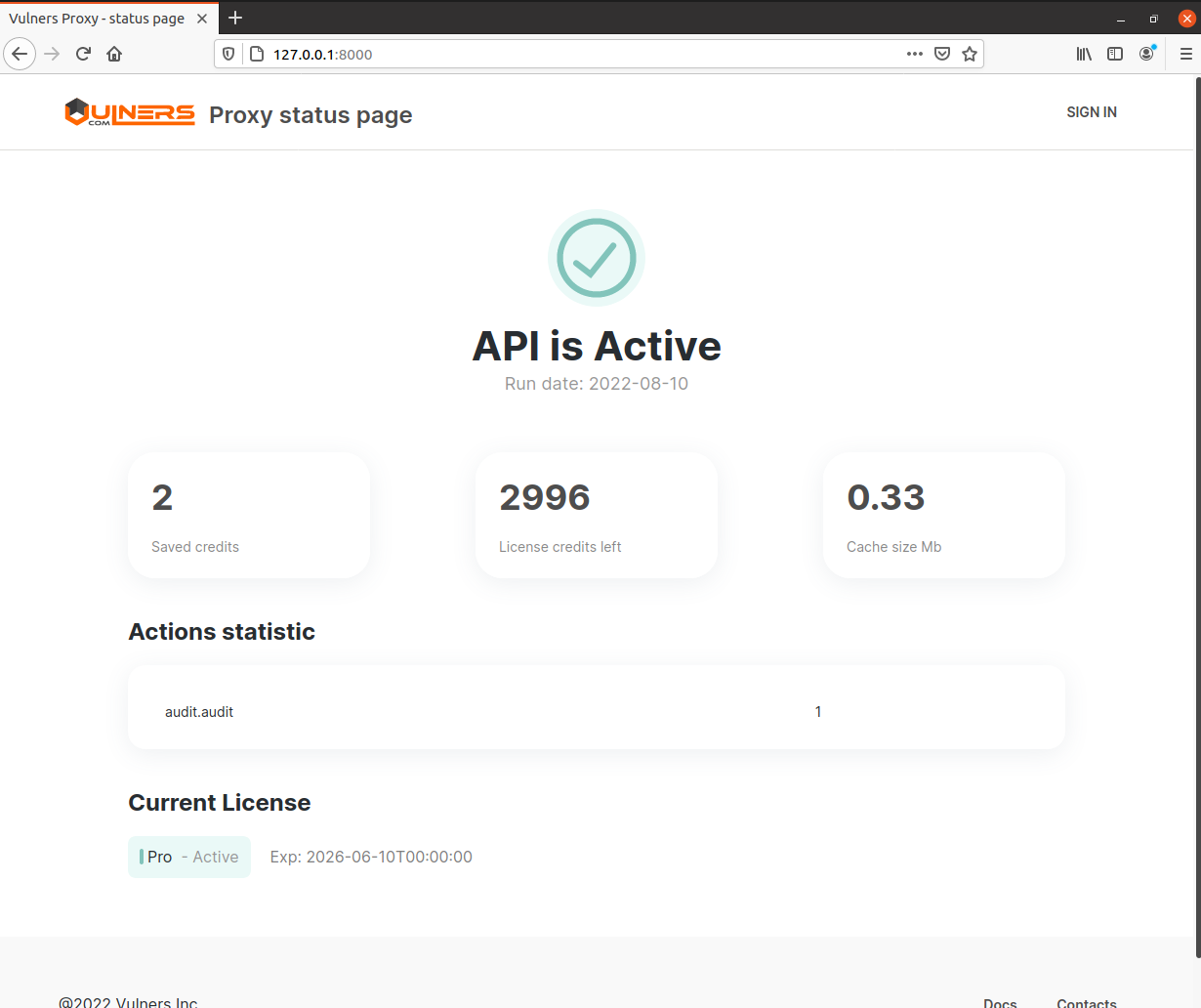When you have many Vulners agents running on similar hosts, they can send lots of identical requests to Vulners. This also applies to using API to control similar machines. To stop wasting Vulners credits you can use Vulners proxy.
Vulners proxy is a caching proxy that allows optimizing the number of API-requests sent by your infrastructure to Vulners database, saving your Vulners credits. To start using Vulners proxy, redirect all your agents and API-requests to it. Vulners proxy processes all requests and caches the result, reducing redundant requests to Vulners database.
Python 3.7+
First add vulners.com pubkey:
wget -O- https://repo.vulners.com/pubkey.txt | apt-key add -
After this create file /etc/apt/sources.list.d/vulners.list
deb http://repo.vulners.com/debian focal main
And install package
apt-get update && apt-get install vulners-proxy
You can clone source code and run server using Python.
- Install python 3.7 or later and python3-pip
- Clone source code from repository
- Install requirements.txt with
pip install -U -r requirements.txt - You can run server manually with command
uvicorn main:app --host 0.0.0.0 --port 8000 - Or you can config systemd to run server as a service. Here is an example configuration
[Unit]
Description=Vulners proxy
After=network.target
[Service]
WorkingDirectory=/var/lib/vulners-proxy
User=nobody
PermissionsStartOnly=true
ExecStart=/usr/local/bin/uvicorn main:app --host 0.0.0.0 --port 8000
[Install]
WantedBy=multi-user.target
Proxy configuration is located in file /etc/vulners_proxy/vulners_proxy.conf. Here is an example.
[logging]
LogFile = /var/log/vulners_proxy/vulners_proxy.log
LogLevel = ERROR
[app]
Workers = 1
Port = 8000
Host = 0.0.0.0
Reload = False
ApiCacheTimeout = 3600 # seconds
CacheTimeout = 10800 # seconds
CacheDir = /tmp/vulners-proxy.cache/
StatisticCacheDir = /tmp/vulners-proxy.statistic.cache/
Secret = secret_for_encrypt_ip_fqdn # 32 symbols required length
EnableEncryption = 0 # 0 - disabled, 1 - enabled
[vulners]
ApiKey = YOUR_SECRET
EnableReportFilter = 0 # 0 - disabled, 1 - enabled
ReportFilterTag = "" # Vulners Agent tag, that will be used to filter reporting API results
You can set logging settings, proxy server host and port, cache directory and timeout.
Also, proxy can encrypt IP address and FQDN of your agents before forwarding them to Vulners. To enable this feature set secret key and EnableEncryption flag to 1.
NB. While encryption is enabled you won't be able to see readable agent identifiers in Linux Scanner dashboard, only hashes. If you want to get nice reports you should config custom dashboard on your side of proxy. For example, you can use Defect Dojo with Vulners plugin.
You can filter Vulners Agents reports for agents behind your Proxy. To do this, give the agents a unique tag and write it in the report filter configuration on the proxy.
Run service
systemctl daemon-reload; systemctl enable vulners-proxy; systemctl start vulners-proxy
Now you should config your Vulners Agents and redirect traffic to proxy. Agent configuration is located in file /etc/vulners/vulners_agent.conf.
Add proxy host address at the end.
[DEFAULT]
api_key = YOUR_SECRET
vulners_host = http://<proxy_vm_ip_address_or_fqdn>:8000
If you want to redirect your API requests to proxy, use constructor with server_url parameter like this:
import vulners
vulners_api = vulners.VulnersApi(api_key="YOUR_SECRET", server_url="http://<proxy_vm_ip_address_or_fqdn>:8000")
# Plain text software + version example for Ngnix 1.4
sw_results = vulners_api.get_software_vulnerabilities("nginx", "1.4")
sw_exploit_list = sw_results["exploit"]
Vulners Proxy has a simple web GUI. With GUI you can control proxy status, expenses and some statistics. To login you should set your API key in proxy configuration. To generate API key log in to vulners.com, go to userinfo space. Then choose "apikey" section. Choose "scan" in scope menu and click "Generate new key". You will get an api-key looking like this: RGB9YPJG7CFAXP35PMDVYFFJPGZ9ZIRO1VGO9K9269B0K86K6XQQQR32O6007NUK
To get GUI, open proxy host in browser
Finally, you can simply run Docker image.
docker run vulners/proxy
Or you can forward default port and set API key, so you could use UI
docker run -p 80:8000 -e apiKey=YOUR_SECRET vulners/proxy
To set configuration, mount config file to your container
docker run --rm -p 8000:8000 -v /path/to/local/config.conf:/etc/vulners_proxy/vulners_proxy.conf vulners/proxy:latest
